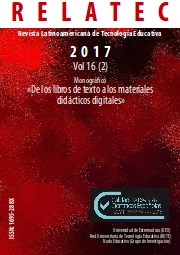Pilot phase study of tablets in early childhood and primary education in Uruguay within Plan Ceibal
DOI:
https://doi.org/10.17398/1695-288X.16.2.223Keywords:
Educational Technology, Primary Education, Technology Integration, Teachers AttitudesAbstract
This article presents reflections and results from a study about the pilot phase developed by Ceibal Plan concerning to the inclusion of tablets in early childhood education and primary education in Uruguay (2013-2014). The research is carried out from a constructivist perspective with a socio-cultural orientation, developing an exploratory strategy. The study attempt to know school’s technologies conditions, activities with tablets, their contexts and aims from teacher’s perspective. The sample design was developed taking into account strategic approaches, building a population that involved thirty schools from Montevideo and Canelones. The results provide information on technological infrastructure and human resources, activities contexts and aims proposed by teachers. The conclusions describes school's conditions about Internet access, administrative and pedagogical uses with the technological resources, as well as activities folowing digital literacy and pedagogical goals. In general terms, there is a favorable attitude from teachers about integrating the tablets in the first grades of schooling, but also some difficulties are recognized during the development of the pilot test.
Downloads
References
Area Moreira, Manuel (2014). La alfabetización digital y la formación de la ciudadanía del siglo XXI. Revista Integra Educativa, 7(3), 21-33. Recuperado de http://www.scielo.org.bo/scielo.php?script=sci_arttext&pid=S1997-40432014000300002&lng=es&tlng=es.
Autor, Autor, Autor, Autor (AÑO) TITULO.
Coll, C. Mauri, T. y Onrubia, J. (2008a) La utilización de las TIC en la educación. Del diseño tecno-pedagógico a las prácticas de uso. En C.
Coll & C. Monereo, Aprender y enseñar con las tecnologías de la información y comunicación. (pp.75- 100) Madrid: Ediciones Morata.
Coll, C., Mauri, T. y Onrubia, J. (2008b). Análisis de los usos reales de las TIC en contextos educativos formales: una aproximación sociocultural. Revista Electrónica de Investigación Educativa, 10 (1). Recuperado de http://redie.uabc.mx/vol10no1/contenido-coll2.html.
Illmer, D., Rosas, R., Véliz, S., Ramirez, M., Aparicio, A., Benavente, C.y Thibaut, C. (2013). Construcción y estandarización de un instrumento de evaluación de aprendizajes esperados en educación parvularia basado en tablet. Pensamiento Educativo. Revista de Investigación Educacional Latinoamericana, 50(2), 147-162.
Mares, L. (2012) Tablets en educación. Oportunidades y desafíos en políticas uno a uno. Organización de Estados Iberoamericanos (OEI). Red Latinoamericana Portales Educativos. RELPE. Recuperado de http://www.relpe.org/publicaciones-2/tablets-en-educacionoportunidades-y-desafios-en-politicas-1-a-1/
Portal Ceibal (2007) Plan Ceibal. www.ceibal.edu.uy
Plaza, B. y Pérez, M. (2012) Las tabletas en la educación: ¿implica un cambio en la metodología la introducción de un nuevo dispositivo? Revista DIM. Didáctica y Multimedia. Año 7. Nº 22. Recuperado de http://www.oei.es/historico/noticias/spip.php?article10063
Roclaw, E. (2008). Nuevas tecnologías y su impacto en el nivel inicial. En L. Moreau, M.I. Filipa, N.A. Pedroza, A. Porstein & N. Salles Del cuerpo a la Pc. Buscando sentidos en el Nivel Inicial. (pp. 123- 144) Buenos Aires: Puerto Creativo.
Rolandi, A.M. (2012) TIC y Educación Inicial. Desafíos de una práctica digital en el Jardín de Infantes. Rosario: Homo Sapiens Ediciones.
Universidad de La Frontera, Instituto de Informática Educativa (2008) Estudio de implementación de experiencia piloto de informática educativa en jardines infantiles de Fundación INTEGRA. Informe final.
Temuco, Chile. Recuperado de http://www.integra.cl/centro-de-documentacion/estudios/estudio-de-implementacion-de-experiencia-piloto-de-informatica-educativa-en-jardines-infantiles-de-fundacion-integra-informe-final
Downloads
Published
Issue
Section
License
Authors who publish in this journal accept the following conditions:
1. The Author retains copyright in the article. Upon acceptance of the article, the author shall grant to the Publisher the right of first publication of the article. with the dcoument registered with the Creative Commons Attribution-NonCommercial-NoDerivative 4.0 International (CC BY-NC-ND) license, which allows to third parties to use what is published whenever they mention the authorship of the work and the first publication in this journal.
2. Authors can make other independent and additional contractual agreements for the non-exclusive distribution of the article published in this journal (eg, include it in an institutional repository or publish it in a book) provided they clearly indicate that the work was published for the first time in this journal.
3. Authors are allowed and recommended to publish their work on the Internet (for example on institutional or personal pages) before and during the review and publication process, as it can lead to productive exchanges and a greater and faster diffusion of published work (see The Effect of Open Access).









